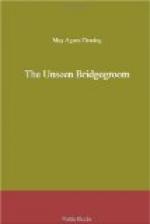“Please to take your supper,” was Mrs. Sharpe’s practical answer to this insane outburst. “Don’t be foolish.”
She lifted Mollie bodily up, led her over, seated her in her chair, poured her out a cup of tea, and made her drink it, before that half-distracted creature knew what she was about.
“Now take another,” said sensible Mrs. Sharpe; “tea will do you a power of good; and eat something; there’s nothing like good, wholesome victuals for curing people of notions.”
Wearied out in body and mind, Mollie let herself be catered for in submissive silence. She took to her new nurse as she had never taken to any one else in this horrid house. She had a kindly face, had Mrs. Susan Sharpe.
“You feel better now, don’t you?” said that worthy woman, the meal completed. “Suppose you go to bed? You look tired. Let me undress you and tuck you in.”
And again willful Mollie submitted, and dropped asleep as soon as her head was fairly on the pillow. Motherly Mrs. Sharpe “tucked her in” and kissed her, and then, with the remains of the supper, went down-stairs to partake of her own evening repast.
Mrs. Oleander took tea with her servants, and was very gossipy indeed. So, too, was old Sully; so, likewise, was old Peter. The beverage that exhilarates seemed to lighten their aged hearts wonderfully; but Mrs. Susan Sharpe did not thaw out under the potent spell of the best English breakfast tea. Silent and attentive, she ate, and drank, and listened, and responded when directly addressed; and, when it was over, helped Sally to clear up, and then pounced upon a basket of undarned hose under the table, and worked away with a will. Her energy and good-will, and the admirable manner in which she filled up the holes in the stockings with wondrous crisscross work, quite won the hearts of both Sally and Sally’s mistress.
The clock struck nine; work was laid aside; Mrs. Oleander read a chapter aloud out of the Bible, and they then all adjourned to their respective chambers. Doors and windows had been secured at nightfall, Tiger and Nero liberated—their hoarse, deep growls every now and then making night hideous.
Up in her own apartment, Mrs. Susan Sharpe’s first act was to pull up the curtain and seat herself by the window. The night was pitch dark—moonless, starless—with a sighing wind and a dully moaning sea. It was the desolation of utter desolation, down in that dismal sea-side prison—the two huge dogs below the only living things to be heard.
“It’s enough to drive any one mad, this horrible place,” said Mrs. Susan Sharpe, to herself; “and the very weather seems in the conspiracy against us.”
She took her lamp as she spoke, and held it close to the window, with an anxious, listening face. Its solitary red ray streamed far out over the black road.
Five, ten, fifteen minutes passed, then a sound rent the night silence—a long, shrill, sharp whistle.




